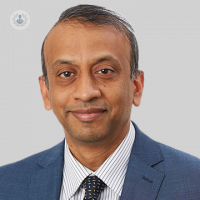Lump in the neck that moves: when to see a doctor
Written in association with:You may be concerned if you find a lump in your neck, such as a pea sized lump that moves. Most neck lumps tend to resolve in a few days and generally don’t need investigating unless they persist. We’ve asked one of our top ENT head and neck surgeons Mr Prasad Kothari to explain the possible causes of lumps in the neck, from swollen lymph glands to neck cancer, and when it’s time to have it checked out by a doctor.

What causes lumps in the neck?
Neck lumps in adults and children can be due to different reasons. Most neck lumps in children are lymph nodes (lymph glands) as a result of an infection in the throat like tonsillitis, ear infection or any other infection.
Neck lumps in adults can also be due to infection in the lymph nodes but can also arise from other structures like the thyroid gland or salivary gland etc.
Though most neck lumps are benign, there are a small proportion of lumps which are not and can be due to more sinister causes like cancer. Cancerous lumps tend to be painless and have a hard consistency as against soft benign lumps.
Are all lumps in the neck cancerous?
Only a small proportion of neck lumps are cancerous. Most of these are due to the spread of cancer from areas in the mouth or throat. Some cancerous neck lumps are due to a condition called Lymphoma, which affects all of the lymph system. Very rarely neck lumps can be due to spread of cancer from other areas in the body.
Read more on the types of head and neck cancer
What can cause a lump in the neck that moves?
Some people may be concerned if they find a lump in the neck that moves, whether it is with or without pain. Neck lumps which move on swallowing are likely to be arising from the thyroid gland in adults and in children can be due to a developmental cyst called thyroglossal cyst. Most thyroid swellings are benign but any thyroid swelling which comes on suddenly needs investigating.
What is a thyroglossal cyst and what causes them?
Thyroglossal cysts are developmental cysts due to entrapment of cells when the thyroid gland is formed. These cysts typically present as a swelling in the midline of the neck as a painless lump which moves when you protrude the tongue. Occasionally these can get infected and can cause a painful swelling which resolves with antibiotic treatment. If symptomatic, these cysts will need to be removed surgically.
When should I have my neck lump investigated?
Any neck lump which persists over four weeks or lumps which are hard and painless need investigating as soon as possible. All other lumps which do not resolve will also need investigating.
Can a neck lump be a tendon problem?
Tendon problems do not cause neck lumps.
Book an appointment with Mr Kothari if you’re worried about a persistent neck lump.


